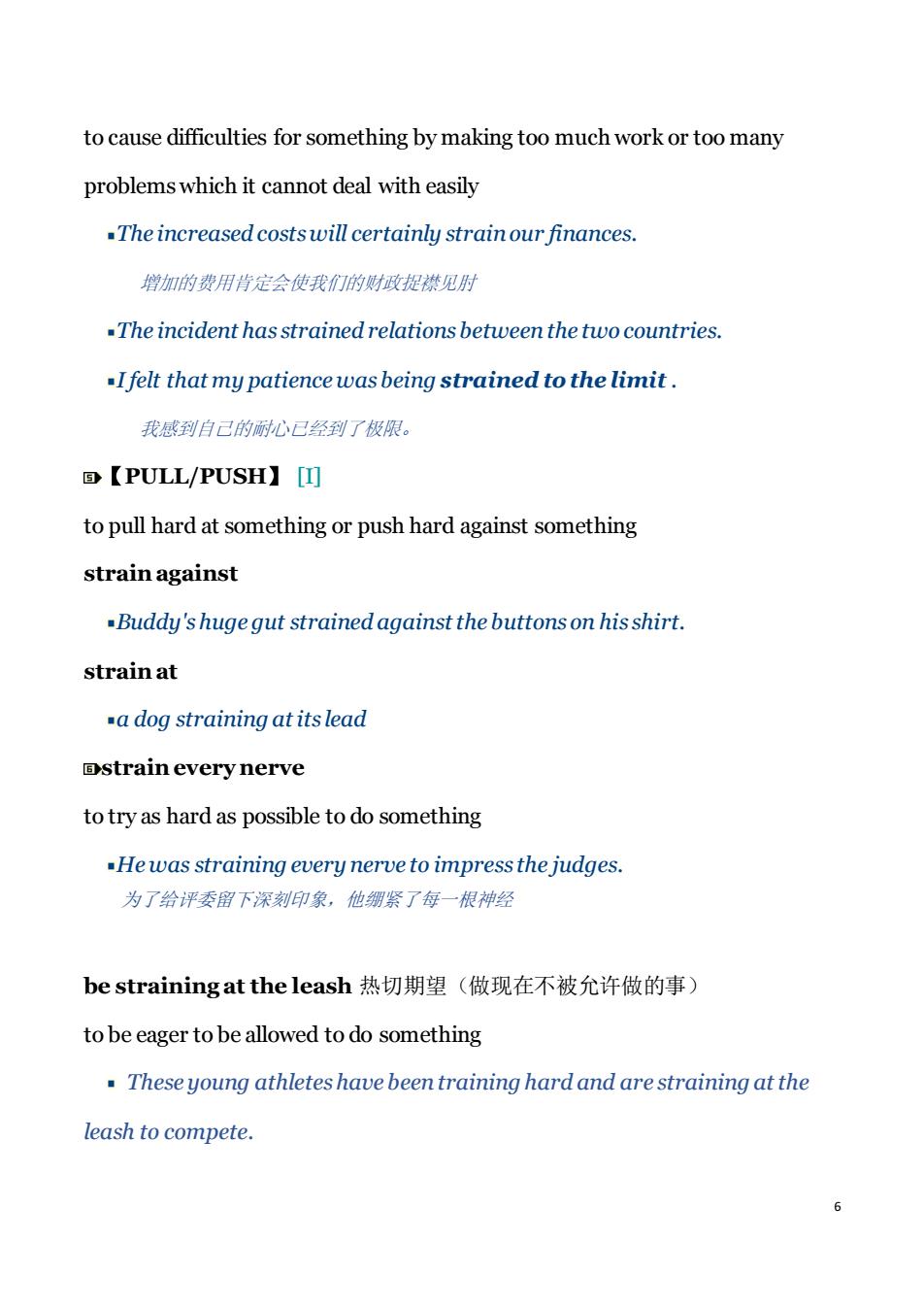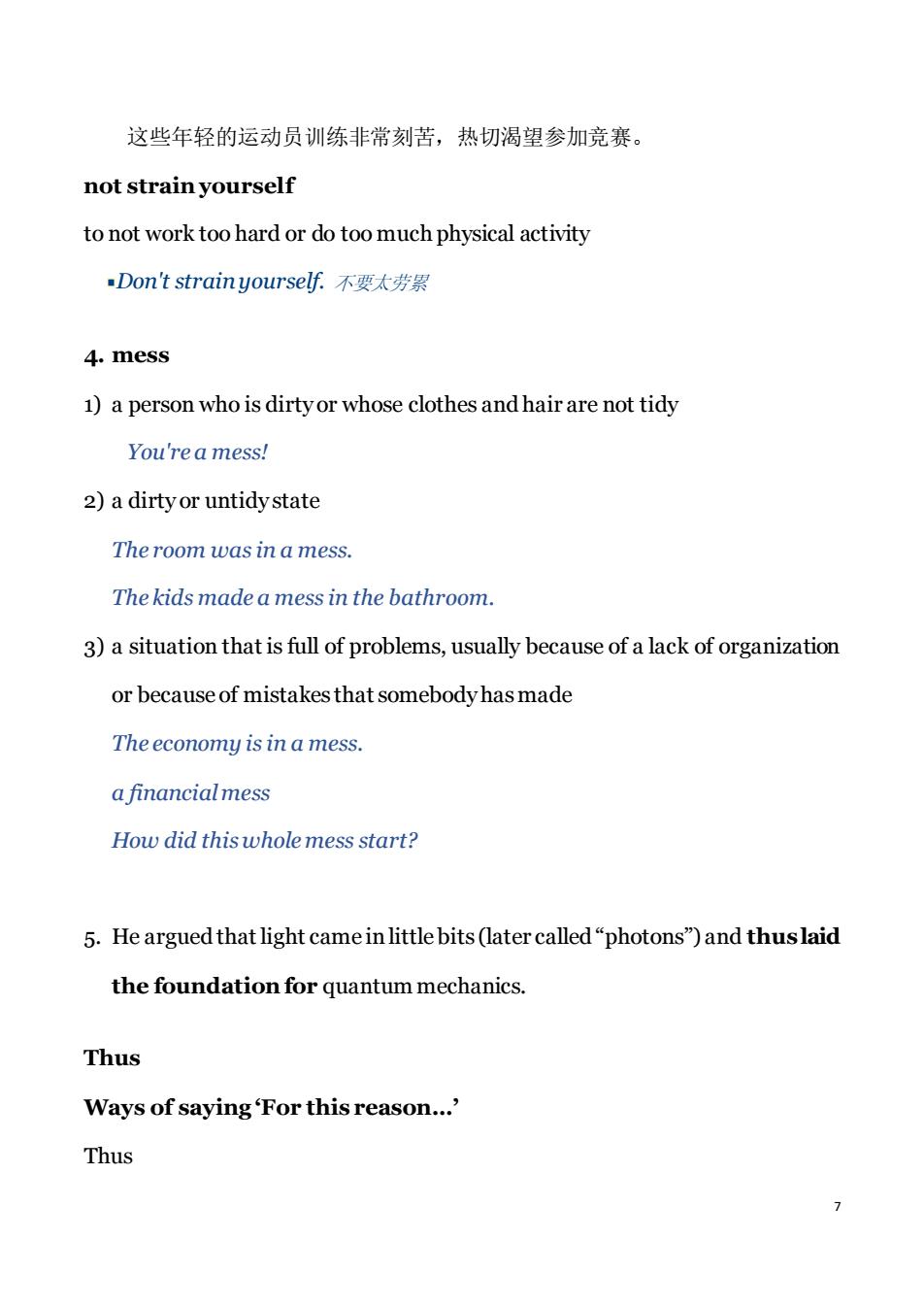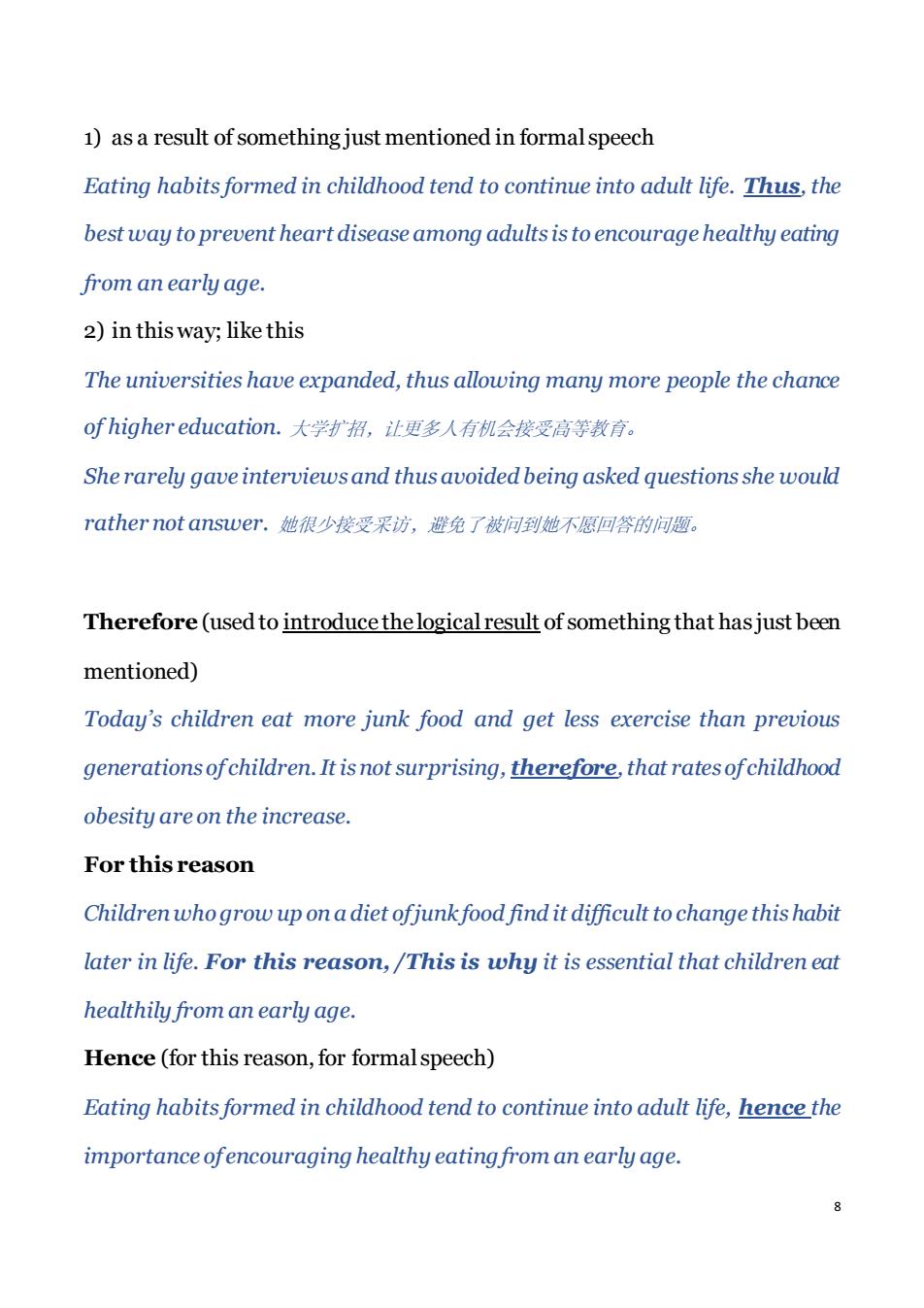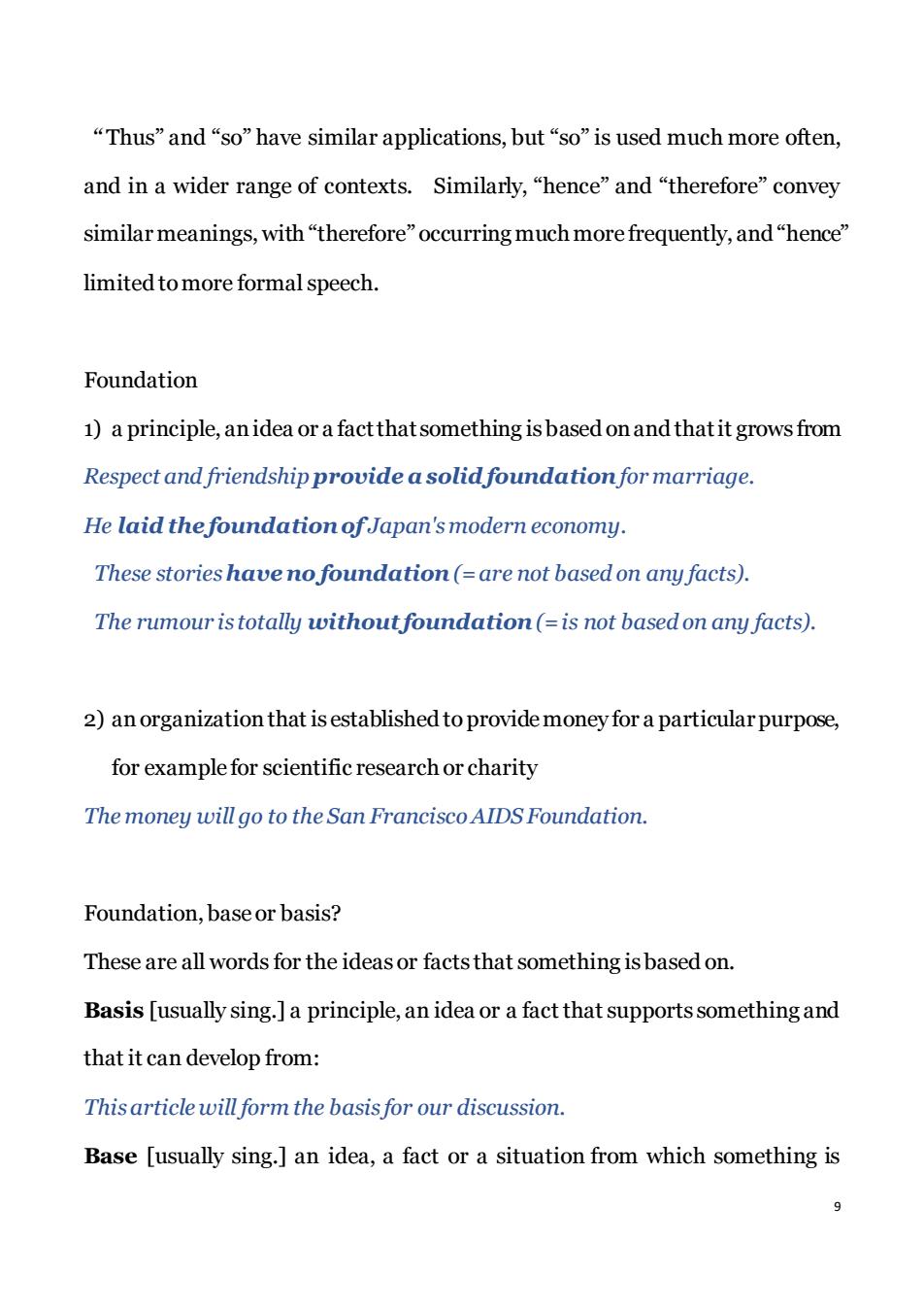
to cause difficulties for something by making too much work or too many problems which it cannot deal with easily "The increased costs will certainly strain our finances. 增加的费用背定会使我们的财政捉襟见时 .The incident has strained relations between the two countries. .Ifelt that my patience was being strained to the limit. 我感到自己的心已经到了极限。 回【PULL/PUSH】[I to pull hard at something or push hard against something strain against .Buddy's huge gut strained against the buttons on his shirt. strain at a dog straining at its lead ostrain every nerve to try as hard as possible to do something .He was straining every nerve to impress the judges. 为了给评委留下深刻印象,他绷紧了每一根神经 be straining at the leash热切期望(做现在不被允许做的事) to be eager to be allowed to do something .These young athletes have been training hard and are straining at the leash to compete
6 to cause difficulties for something by making too much work or too many problems which it cannot deal with easily The increased costs will certainly strain our finances. 增加的费用肯定会使我们的财政捉襟见肘 The incident has strained relations between the two countries. I felt that my patience was being strained to the limit . 我感到自己的耐心已经到了极限。 【PULL/PUSH】 [I] to pull hard at something or push hard against something strain against Buddy's huge gut strained against the buttons on his shirt. strain at a dog straining at its lead strain every nerve to try as hard as possible to do something He was straining every nerve to impress the judges. 为了给评委留下深刻印象,他绷紧了每一根神经 be straining at the leash 热切期望(做现在不被允许做的事) to be eager to be allowed to do something These young athletes have been training hard and are straining at the leash to compete

这些年轻的运动员训练非常刻苦,热切渴望参加竞赛。 not strain yourself to not work too hard or do too much physical activity Don't strainyourse乐.不要太劳累 4.mess 1)a person who is dirty or whose clothes and hair are not tidy You'rea mess! 2)a dirty or untidystate The room was in a mess. The kids made a mess in the bathroom. 3)a situation that is full of problems,usually because of a lack of organization or because of mistakes that somebody has made The economy is in a mess. afinancialmess How did this whole mess start? 5.He argued that light came in little bits(later called"photons")and thuslaid the foundation for quantum mechanics. Thus Ways of saying For this reason.' Thus 7
7 这些年轻的运动员训练非常刻苦,热切渴望参加竞赛。 not strain yourself to not work too hard or do too much physical activity Don't strain yourself. 不要太劳累 4. mess 1) a person who is dirty or whose clothes and hair are not tidy You're a mess! 2) a dirty or untidy state The room was in a mess. The kids made a mess in the bathroom. 3) a situation that is full of problems, usually because of a lack of organization or because of mistakes that somebody has made The economy is in a mess. a financial mess How did this whole mess start? 5. He argued that light came in little bits (later called “photons”) and thus laid the foundation for quantum mechanics. Thus Ways of saying ‘For this reason.’ Thus

1)as a result of somethingjust mentioned in formal speech Eating habits formed in childhood tend to continue into adult life.Thus,the best way to prevent heart disease among adults is to encourage healthy eating from an early age 2)in this way;like this The universities have expanded,thus allowing many more people the chance of higher education.大学扩招,让更多人有机会接受高等教育。 She rarely gave interviews and thus avoided being asked questions she would rather not answer.她很少接受采访,避免了被问到她不愿回答的问题。 Therefore(used to introduce thelogicalresult of something that has just been mentioned) Today's children eat more junk food and get less exercise than previous generations ofchildren.It is not surprising,therefore,that rates ofchildhood obesity are on the increase For this reason Children who grow up on a diet ofjunk food find it difficult to change this habit later in life.For this reason,/This is why it is essential that children eat healthily from an early age. Hence(for this reason,for formalspeech) Eating habits formed in childhood tend to continue into adult life,hence the importance ofencouraging healthy eating from an early age
8 1) as a result of something just mentioned in formal speech Eating habits formed in childhood tend to continue into adult life. Thus, the best way to prevent heart disease among adults is to encourage healthy eating from an early age. 2) in this way; like this The universities have expanded, thus allowing many more people the chance of higher education. 大学扩招,让更多人有机会接受高等教育。 She rarely gave interviews and thus avoided being asked questions she would rather not answer. 她很少接受采访,避免了被问到她不愿回答的问题。 Therefore (used to introduce the logical result of something that has just been mentioned) Today’s children eat more junk food and get less exercise than previous generations of children. It is not surprising, therefore, that rates of childhood obesity are on the increase. For this reason Children who grow up on a diet of junk food find it difficult to change this habit later in life. For this reason, /This is why it is essential that children eat healthily from an early age. Hence (for this reason, for formal speech) Eating habits formed in childhood tend to continue into adult life, hence the importance of encouraging healthy eating from an early age

“Thus”and“so”have similar applications,but“so”is used much more often, and in a wider range of contexts.Similarly,“hence"”and“therefore”convey similar meanings,with "therefore"occurring much more frequently,and "hence" limited to more formal speech. Foundation 1)a principle,an idea or a factthat something is based on and that it grows from Respect and friendship provide a solid foundation for marriage. He laid the foundation of Japan's modern economy. These stories have no foundation(=are not based on any facts). The rumour is totally without foundation(=is not based on any facts). 2)an organization that is established to provide money for a particular purpose, for example for scientific research or charity The money will go to the San Francisco AIDS Foundation. Foundation,base or basis? These are all words for the ideas or facts that something is based on. Basis [usually sing.a principle,an idea or a fact that supports something and that it can develop from: Thisarticle will form the basis for our discussion. Base [usually sing.]an idea,a fact or a situation from which something is
9 “Thus” and “so” have similar applications, but “so” is used much more often, and in a wider range of contexts. Similarly, “hence” and “therefore” convey similar meanings, with “therefore” occurring much more frequently, and “hence” limited to more formal speech. Foundation 1) a principle, an idea or a fact that something is based on and that it grows from Respect and friendship provide a solid foundationfor marriage. He laid the foundation of Japan's modern economy. These stories have no foundation(= are not based on any facts). The rumour is totally without foundation(= is not based on any facts). 2) an organization that is established to provide money for a particular purpose, for example for scientific research or charity The money will go to the San Francisco AIDS Foundation. Foundation, base or basis? These are all words for the ideas or facts that something is based on. Basis [usually sing.] a principle, an idea or a fact that supports something and that it can develop from: This article will form the basis for our discussion. Base [usually sing.] an idea, a fact or a situation from which something is

developed: His arguments have a sound economic base. Basis and base 相同点:都可以作名词使用,表示论点、理论、想法的出发点、基础或根据。 区别: 1)base作名词的时候,可以指“物体的底部”还有“活动的基地”,而basis却 没有这些含义: 2)base作动词的时候,可以表示“以.为基础”和“以.为主要地点”,但 basis却不能作动词使用。 Foundation is often used to talk about larger or more important things than basis: He laid the foundations of Japan's modern economy. These figures formed the basis of their pay claim. Patterns a/the basis/foundation/base for/ofsomething a secure/solid/sound/strong/weak basis/foundation/base to form the basis/foundation/base of something to be without basis/foundation 6.He described his theory of specialrelativity:spaceand time were threads in 10
10 developed: His arguments have a sound economic base. Basis and base 相同点:都可以作名词使用,表示论点、理论、想法的出发点、基础或根据。 区别: 1) base 作名词的时候,可以指 “物体的底部” 还有 “活动的基地”,而 basis 却 没有这些含义; 2) base 作动词的时候,可以表示 “以.为基础”和 “以.为主要地点”,但 basis 却不能作动词使用。 Foundation is often used to talk about larger or more important things than basis: He laid the foundations of Japan’s modern economy. These figures formed the basis of their pay claim. Patterns a/the basis/foundation/base for/of something a secure/solid/sound/strong/weak basis/foundation/base to form the basis/foundation/base of something to be without basis/foundation 6. He described his theory of special relativity: space and time were threads in